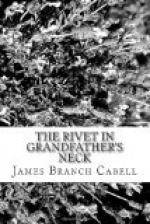At the thought of this Rudolph Musgrave laughed as he fell to pacing up and down before her.
“Life!” he cried, again, with a helpless gesture; and then smiled at her, very sadly. “’Didn’t I know there was something better in life than grubbing after musty tribes and customs and folk-songs?’” he quoted. “Why, what a question to ask of a professional genealogist! Don’t you realize, Patricia, that the very bread I eat is, actually, earned by the achievements of people who have been dead for centuries? and in part, of course, by tickling the vanity of living snobs? That constitutes a nice trade for an able-bodied person as long as men are paid for emptying garbage-barrels—now, doesn’t it? And yet it is not altogether for the pay’s sake I do it,” he added, haltingly. “There really is a fascination about the work. You are really working out a puzzle,—like a fellow solving a chess-problem. It isn’t really work, it is amusement. And when you are establishing a royal descent, and tracing back to czars and Plantagenets and Merovingians, and making it all seem perfectly plausible, the thing is sheer impudent, flagrant art, and you are the artist—” He broke off here and shrugged. “No, I could hardly make you understand. It doesn’t matter. It is enough that I have bartered youth and happiness and the very power of living for the privilege of grubbing in old county records.”
He paused. It is debatable if he had spoken wisely, or had spoken even in consonance with fact, but his outburst had, at least, the saving grace of sincerity. He was pallid now, shaking in every limb, and in his heart was a dull aching. She seemed so incredibly soft and little and childlike, as she looked up at him with troubled eyes.
“I—I don’t quite understand,” she murmured. “It isn’t as if you were an old man, Olaf. It isn’t as if—”
But he had scarcely heard her. “Ah, child, child!” he cried, “why did you come to waken me? I was content in my smug vanities. I was content in my ignorance. I could have gone on contentedly grubbing through my musty, sleepy life here, till death had taken me, if only you had not shown me what life might mean! Ah, child, child, why did you waken me?”
“I?” she breathed; and now the flush of her cheeks had widened, wondrously.
“You! you!” he cried, and gave a wringing motion of his hands, for the self-esteem of a complacent man is not torn away without agony. “Who else but you? I had thought myself brave enough to be silent, but still I must play the coward’s part! That woman I told you of—that woman I loved—was you! Yes, you, you!” he cried, again and again, in a sort of frenzy.
And then, on a sudden, Colonel Musgrave began to laugh.
“It is very ridiculous, isn’t it?” he demanded of her. “Yes, it is very—very funny. Now comes the time to laugh at me! Now comes the time to lift your brows, and to make keen arrows of your eyes, and of your tongue a little red dagger! I have dreamed of this moment many and many a time. So laugh, I say! Laugh, for I have told you that I love you. You are rich, and I am a pauper—you are young, and I am old, remember,—and I love you, who love another man! For the love of God, laugh at me and have done—laugh! for, as God lives, it is the bravest jest I have ever known!”




